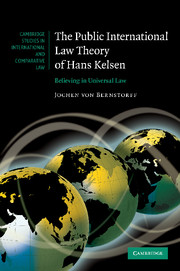Book contents
- Frontmatter
- Contents
- Preface
- Introduction
- PART I The quest for objectivity: the method and construction of universal law
- PART II The outlines of the cosmopolitan project – the actors, sources, and courts of universal law
- 4 The new actors of universal law
- 5 Legal sources as universal instruments of law-creation
- 6 The international judiciary as the functional center of universal law
- 7 The role of the international legal scholar after Kelsen – a concluding reflection
- Postscript – on Kelsenian formalism in international law (2010)
- Career sketches: Hans Kelsen, Alfred Verdross, and Josef Laurenz Kunz
- Bibliography
- Index
- CAMBRIDGE STUDIES IN INTERNATIONAL AND COMPARATIVE LAW
- References
5 - Legal sources as universal instruments of law-creation
Published online by Cambridge University Press: 03 May 2011
- Frontmatter
- Contents
- Preface
- Introduction
- PART I The quest for objectivity: the method and construction of universal law
- PART II The outlines of the cosmopolitan project – the actors, sources, and courts of universal law
- 4 The new actors of universal law
- 5 Legal sources as universal instruments of law-creation
- 6 The international judiciary as the functional center of universal law
- 7 The role of the international legal scholar after Kelsen – a concluding reflection
- Postscript – on Kelsenian formalism in international law (2010)
- Career sketches: Hans Kelsen, Alfred Verdross, and Josef Laurenz Kunz
- Bibliography
- Index
- CAMBRIDGE STUDIES IN INTERNATIONAL AND COMPARATIVE LAW
- References
Summary
As we have seen, the cosmopolitan project of Kelsen and Kunz included strong international organizations capable of enforcing international legal rules at the universal level. In theoretical terms, these organizations were also able to grant rights directly to individuals and impose obligations on them. As described in the last chapter, Kelsen sought to break open the doctrinal restrictions of the theory of unions of states, which was fixated on the notion of sovereignty. Not only would this make it possible to better classify new forms of legal organization doctrinally, it would also allow them to be presented vis-à-vis the states as largely autonomous legal orders. However, the creation of new forms of organization by international politics presupposed the existence of efficient instruments of law creation. To that end, Kelsen maintained, the legal sources of international law represented by custom and the treaty had to be made available to international politics as substantively unrestricted instruments of societal change. Before examining in greater detail the Kelsenian theory of treaty law and customary law, I will take a look at the general foundations of Kelsen's doctrine of legal sources.
Sources beyond metaphysics and consensus
Kelsen's theory of the sources of international law was based on the assumption of the hypothetical character of the law. That international law found its objective basis neither in posited meta-legal values, nor in a consensus of sovereign state wills.
- Type
- Chapter
- Information
- The Public International Law Theory of Hans KelsenBelieving in Universal Law, pp. 153 - 190Publisher: Cambridge University PressPrint publication year: 2010



